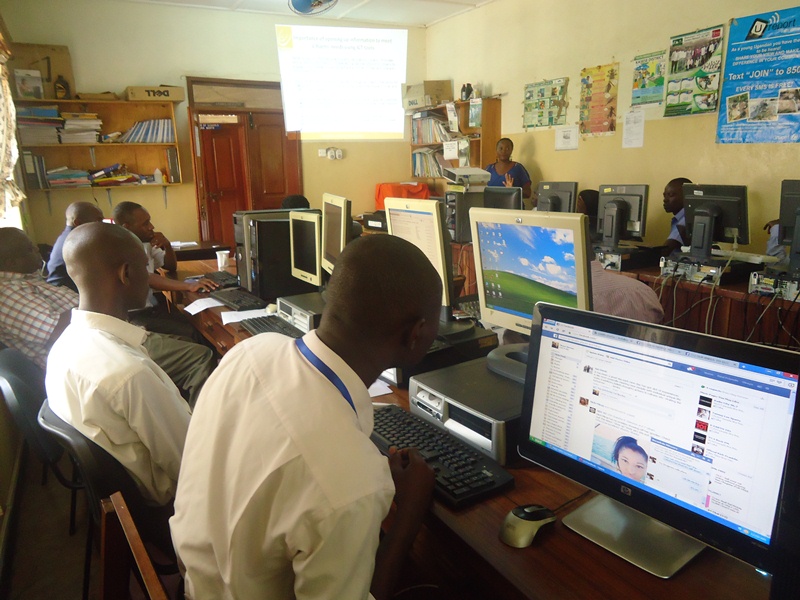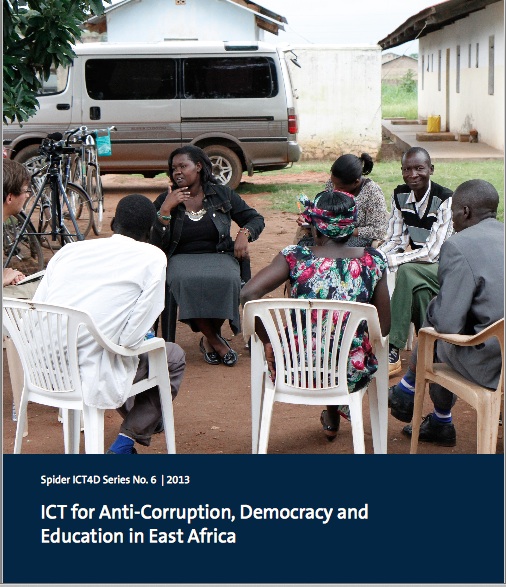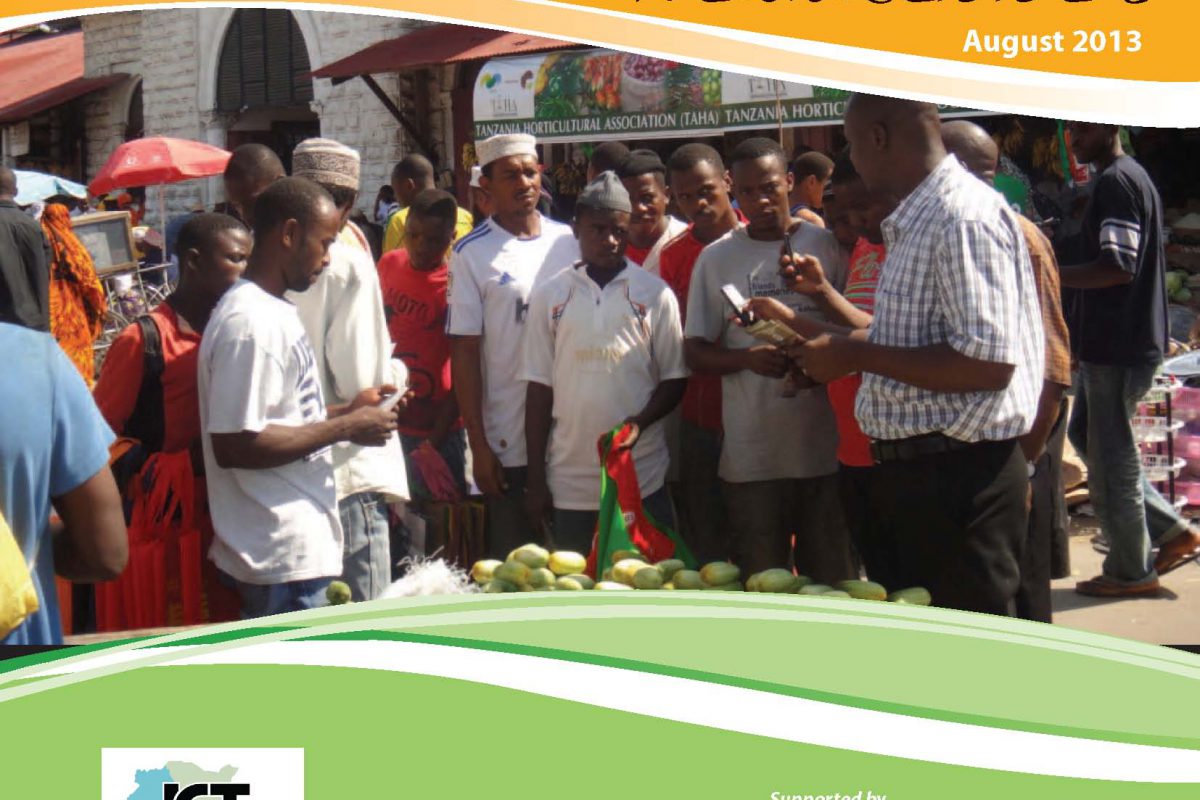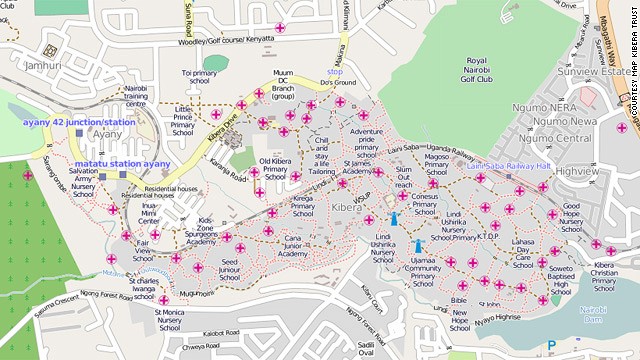This month, the Collaboration on International ICT Policy in East and Southern Africa (CIPESA) and the E-Society Resource Centre Kasese trained local leaders in Kasese district in the use of ICTs for improved governance and service delivery. During the March 20-21 2014 workshop, local leaders of the western Uganda district were also trained in using ICTs for information sharing and promoting citizen participation.
Speaking at the workshop, District Information Officer John Thawite urged local leaders to break away from the culture of secrecy and work in accordance with the 2005 Uganda Access to Information Act. “Meaningful participation in democratic processes requires informed participants hence the need for increased access to information,” he said.
However, Mr. Thawite noted some challenges to better access to information: poor facilitation for information officers, lack of ICT tools to process information requests, the Official Secrets Act of 1964 which bars public servants from releasing certain information, and poor coordination of information systems between departments.
During introductory sessions, participants were introduced to the basic elements of computer use, the internet and information security. Later, they were introduced to the concept of e-governance and its role in improving service delivery. The training included an interaction with the district e-government tools such as the district portal (www.kasese.go.ug), district discussion group (https://dgroups.org/iicd/kasese), E-library for district e-resources (https://elibrary.kasese.go.ug) and the district news portal (https://kasesenews.blogspot.com/).
The workshop also sought to enhance the leaders’ capability to engage with citizens through social media, and illustrated how this engagement could contribute to improved services delivery. According to Alexa.com, Facebook, Twitter, blog post and youtube are among the top ten accessed websites in Uganda and their potential in catalysing citizen participation in governance was emphasised.
Leaders were further encouraged to use the Rwenzururu facebook group (https://www.facebook.com/groups/nokasesesplit/) created in 2012 by community members in Kasese during a CIPESA citizen journalism training to discuss prevailing issues in the region..
Participants welcomed the training with one saying that he would henceforth be able to get access more information about various operations of the government through the various e-governance platforms shared. Another participant asked the e-society Resource Centre to work with heads of departments so that they always send their budgets, minutes of meetings, work plans and other communication to the e-platforms.
CIPESA has since 2011 spearheaded the iParticipate Uganda project. Through grassroots based ICT access centres in Eastern, Western and Northern Uganda, CIPESA creates awareness and builds the capacity and skills of citizens, media and local government to leverage ICTs to catalyse civic participation, democracy monitoring and access to information in Uganda. The E-society Resource Center Kasese is CIPESA’s western region partner. The centre provides support, promotes ICT literacy and the use of ICT for transparency in the Kasese local government.
Article complied by Mr. Samuel Mumbere – E-Society Resource Centre Kasese and Ms. Lillian Nalwoga – CIPESA
Exploring The State of Internet Freedom in Africa
What is the price of security? Should it be your online freedom?
By Juliet Nanfuka
Where do human rights and online rights meet? Is there a clash between online freedom and human rights? Is there room for self-regulation? These are some of the questions that a recently concluded online discussions report on Internet freedom in Africa explores.
Participants from Uganda, Kenya and Nigeria used online platforms to discuss these issues over a four week period at the end of 2013.
A key theme that came out of the report is the recognition of the increased numbers of internet users across the continent and parallel to this, increased measures taken by governments on surveillance of citizens. This, in turn, has brought to the fore many questions about freedom of expression and privacy.
Many countries are faced with contradictory policies when it comes to freedom of expression especially when it is placed alongside national security and stability. As a result, freedom of expression is threatened by restrictive legal measures that infringe on the access and sharing of information. In addition to these are the legal permissions granted to governments with regards to accessing information about users. Requests from African governments, although few, appear to be politically motivated according to the Google Transparency Reports.
In light of this, a participant asked a key question that also raises concerns about censorship, “How much can you restrict if those with no restriction can interact with and pass on information to the restricted using alternative methods of communication?” This led to the recognition of the conflict that exists between online freedom of expression and the state. Such was seen in the 2011 politically motivated ‘Walk to Work’ protests in Uganda in which the national communications regulatory authority, the Uganda Communications Commission, instructed ISPs to block access to social networking sites like Twitter and Facebook for 24 hours. More on this can be found here Internet Freedom in Africa Under Threat.
The report, prepared by the Collaboration on International ICT Policy in East and Southern Africa (CIPESA) in partnership with Paradigm Initiative Nigeria (PIN) can be downloaded here.
New Spider Research Publication on ICT4D in East Africa
The publication “ICT for Anti-corruption, Democracy and Education in East Africa” is the first product of the Swedish Programme for ICT in Developing Region (Spider)’s Research Related to Projects initiative which was devised and first implemented in 2012.
Connecting research directly to Spider supported projects aims to establish a closer connection between ICT4D research and ICT4D practice. The support allows ICT4D researchers in Sweden, in collaboration with researchers and practitioners in partner countries, to carry out research on ongoing ICT4D projects. This has generated research that can contribute more directly to development work, and provide a substantial contribution to poverty reduction and other development goals. The publication covers three thematic areas: anti-corruption, democracy and education. The six contributions span from ethnographic descriptions and analyses to explorations of collaborative design and evaluation of the achievement of set capacity building goals from the capability approach.
The volume is edited by Dr Katja Sarajeva, Program Manager at Spider.
Download the publication here.
ICT4Democracy in East Africa Newsletter August 2013
The ICT4Democracy in East Africa Network recognises that Information and Communication Technology (ICT) has the potential to increase citizens’ participation in decision-making processes, thus strengthening democratisation.
In this issue of the newsletter:
- The Tanzania Commission For Human Rights Takes SMS to The Citizens
- Motivators And Hindrances to Use of ICTs in Citizen Participation in Uganda
- M-Governance: Water Stakeholders Information Ecosystem in Kenya
- ICT4Health Service Delivery in Northern Uganda
- Are ICTs Promoting Social Responsibility? Ushahidi Platform Helps a Patient Get Medical Care
- Fostering Community Empowerment Through ICTs For Service Delivery And Community Participation.
Download the newsletter here.
We are watching you! Tech helps Africans hold governments to account
By Loren Treisman
(CNN) — With hundreds of millions of Africans owning mobile phones, citizens are becoming increasingly well connected. This is providing a powerful opportunity for citizens to access critical information about their parliaments and to report on human rights violations, corruption and poor service delivery.
These interventions are amplifying the voices of marginalized communities and helping citizens to hold governments to account.
For citizens to actively participate in democracy, it is critical that they are able to access information on parliamentary proceedings and elected representatives. MySociety is contributing to this process. It has partnered with local organizations across Africa to build sites like Mzalendo in Kenya and Odekro in Ghana, which enable citizens to access information about parliamentary proceedings and their elected representatives, rate their MPs and gain a better understanding about government’s inner workings.
They’ve taken this process one step further in South Africa. The Open Democracy Advice Centre has created a platform where citizens can submit Freedom of Information Requests. A data repository has been created online, enabling journalists, analysts and campaigners to utilize this information to hold government to account and campaign for improved service delivery.
There’s a real thirst for this information in Africa. In Nigeria, a simple application created by developer Pledge 51 enables citizens to access their constitution by mobile phone and has been downloaded more than 750,000 times. During protests sparked by last year’s fuel crisis, where an increase in the price of fuel resulted in soaring commodity prices, this enabled citizens to exercise their rights against police forces.
Misinformation fueled this crisis, with few citizens understanding the new fuel subsidy payment or oil revenue share in their country. A local organization called BudgIT aimed to address this by generating simple infographics which took citizens through these complex processes in a visual format.
Utilizing the power of social media, this sparked more informed debates and dialogue that contributed to restoring order. The team has since produced a whole series of images that breakdown the Nigerian budget by state and sector, enabling citizens to better understand the country’s budget and to utilize this information to ensure that allocated funds are translated into improved services.
Across the continent, platforms are being developed that enable citizens to use SMS from basic phones to report challenges in service delivery. In the impoverished Khayelitsha township in Cape Town, residents have submitted around 3,000 reports on issues like poor sanitation, electricity and transport to the Lungisa platform from their mobile phones, Facebook and the web. Remarkably, most of the issues have been resolved by the city council.
In Northern Uganda, the brutal Lord’s Resistance Army conflict has displaced hundreds of thousands of people, leaving infrastructure and service delivery in dire straits. A Peace, Recovery and Development Plan has been put in place but progress is limited. Only a few health centers have been established, there’s a severe shortage of drugs, medical workers and equipment and corruption is commonplace.
CIPESA has created a platform populated with information on health programs being implemented in the region and citizen journalists are able to submit reports, photographs and audio footage describing the real situation on the ground, whilst Voluntary Sector Accountability Committees established by WOUGNET are utilizing a similar platform to report on corrupt practices and poor governance. The data collected is being used by the NGOs to hold government to account and advocate for improved services.
In many African countries, youth often feel excluded from the political process. As young people are the biggest consumers of technology, platforms are being developed that enable them to become more actively engaged. In Kenya, Youth Agenda is utilizing an SMS platform to encourage youth to vet their leaders according to policies and attributes instead of along tribal lines. The platform is also used to gauge political opinion. The feedback is collated into reports which are fed into government, giving youth a voice and allowing them to contribute to the development of policy.
Until 2009, Kibera — one of the world’s largest slums and home to more than 250,000 people — appeared only as a blank on online maps. This made it easy for government to ignore the needs of its citizens. Map Kibera has equipped young activists with GPS-enabled phones and has supported them in creating a map of the region, part of a wider program that empowers youth to raise awareness of the challenges faced by their communities and advocate for change.
Plan Cameroon has taken this process a step further in three districts. Once youth have mapped their area, they populate the map with data on service delivery such as access to water points, clean water and hygiene facilities. Local councilors and activists are utilizing this data to mobilize the involved communities to demand better services and advocate for change.
Homegrown solutions are often most effective, as local communities are best able to understand the complex local needs, behaviors and nuances. Some of these hubs such as Jozi Hub in Johannesburg and Co-Creation Hub in Lagos, Nigeria, have targeted programs to support transparency initiatives, thus catalyzing this process.
Undoubtedly, technology isn’t a panacea for all social problems. And at times, such as when the technology utilized isn’t locally available or where governments lack capacity to respond to issues being reported it can be entirely inappropriate. However, when combined with well devised programs, their power to reach the previously unreachable and to bring the voices of citizens closer to government makes them a significant contributor to the process of ensuring that government’s best serve the interests of their citizens.
This article was published by CNN on August 12, 2013





